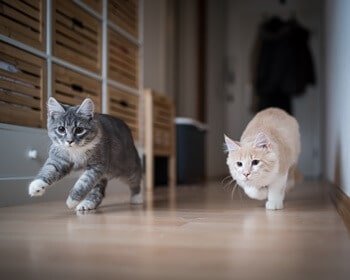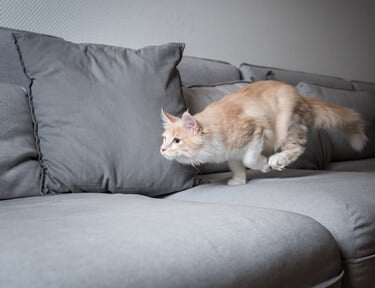When many of us picture cats, we imagine relaxed, serene animals. While that’s true some of the time, it’s not uncommon to see a cat running around frantically. This phenomenon is referred to as “zoomies.”
Cat zoomies are usually a result of unused energy. Cats sleep for most of the day, ensuring that they have enough energy to hunt. Domesticated cats rarely need to track and capture prey, so this energy needs to be expelled in other ways. A bout of the zoomies will help the cat run off any additional vitality.
In and of themselves, cat zoomies are not a huge concern. Almost all cats experience bursts of energy on occasion. All the same, try to understand the reason for your cat’s desire to run around. If you spot other symptoms or odd behaviors, your cat may be feeling unwell.
Why is My Cat So Hyper All of a Sudden?
Many owners are shocked when their cats show a sudden interest in exercise. Cats engage in physical activity on their terms. If a cat is going to make an effort to move, especially at a high pace, it’ll raise the eyebrows of an owner.
If you ask yourself, “why does my cat run around like a psycho?” the answer is zoomies. This is not a medical condition or anything to concern yourself with. Zoomies typically vanish as quickly as they arrive, rarely lasting more than a few minutes at a time.
The only time to be concerned about zoomies is if they become constant. Zoomies are often ascribed to a particular incident or situation. If your cat spends more time running around than resting, especially past kittenhood, something is amiss.
Make your home safe for a zooming cat. That involves ensuring that any breakable objects are out of feline range and leaving a clear path for racing around where possible. Learn any patterns connected to zoomies, though. This will help you predict the behavior ahead of time and, if necessary, prepare for it.
Are Zoomies Normal in Cats?
The occasional bout of the zoomies should be expected in all cats aged 10 or younger. Even some aging felines may show sporadic bursts of desire to move at speed unless they have reached a geriatric age.
Uncharacteristic behavior can be concerning in cats. To truly assess if zoomies are normal, monitor when they occur. Over several days, you should determine the catalyst for such feline excitement.
If your cat’s tendency to run around seems random, look for other unusual actions or physical symptoms of ill health. The Journal of the American Veterinary Medical Association links hyperactivity to issues with the thyroid.
Signs to look out for in a constantly hyperactive cat include:
- Hair loss
- Constant scratching
- Limping and other outward signs of pain
- Drooling
- Wide and dilated eyes
These symptoms could have a range of diagnoses, from an allergic reaction to the ingestion of toxins. An isolated bout of zoomies with no underlying or additional concerns is no vet’s idea of a medical emergency.
What Causes Zoomies in Cats?
The most common explanation for feline zoomies is pent-up energy. Now, the word to note here is energy. That’s not the same as aggression, anxiety, or any other unwelcome emotion.
Consider the average lifestyle of a house cat. As per BSAVA Congress Proceedings, most domesticated felines will sleep for 18 to 20 hours each day. That is not through laziness. Instead, it’s because the simple act of being awake can be exhausting for cats.
Complex movement mechanics matches excellent feline senses. Every time a cat makes a step, as per the Journal of Morphology, 24 different muscles are exercised.
Next, we consider that cats retain a near-constant state of awareness. As mesopredators, cats are aware that they have as many predators as they do prey. This means even a contented cat that feels safe will always be watching, listening, and scenting danger.
As a result of this tiring lifestyle, cats need their sleep to remain safe. Frequently, the cat will flip-flop between deep and REM sleep. Deep sleep is when a cat’s body and muscles repair themselves. REM sleep is akin to dozing and may see the cat dream.
The purpose of deep sleep is to ensure cats are strong, lively, and full of vitality when they need to be. Cats never lose their wild instincts, no matter how domesticated. Even the most loving and tame of pets have a desire to hunt.
When a cat doesn’t need to hunt, pent-up energy arises. The cat has nowhere to channel this desire to stalk prey. As a result, it needs to work off some excess vim and vigor. Zoomies make this possible and explain why cats quickly find themselves exhausted all over again.

Why Do Cats Get Zoomies at Night?
Zoomies are harmless, even amusing, when they occur by day. At night, zoomies can ruin your evening. Cats can grow active after dark and rarely consider human sleep. Silent hunters by day, cats sound heavy-footed in the evening.
Most of the time, a cat will get the zoomies at night for the same reason as the day. They have energy levels stored, and this vitality needs to be expelled somehow. The cat is just doing what comes naturally to it.
Some cats deliberately sleep all day to remain active at night. The evening, when humans are asleep, can be a peak time for many felines. Cats can see in very dim light and relish the calm of the night. It offers a chance to hunt and explore without human interference.
Understanding why cats get the zoomies at night doesn’t help you rest, though. Your cat will likely make a lot of noise and may break delicate objects. Once is a forgivable accident, but anything more frequent and your understanding will be sorely tested.
With this in mind, it’s advisable to exhaust your cat before bedtime. This means your cat is likelier to sleep through the night, and any zoomies can be saved for daybreak.
This does not mean waking your cat up when it starts to doze, though. That will end with scratching and biting that harms your bond. Instead, try to play with your cat, then feed and groom it as late as possible.
Undertaking these activities an hour before bed will likely leave your cat contentedly sleeping away for hours. If you feed your cat in the early evening to get it out of the way, expect the animal to wake up filled with energy in the small hours of the morning.
Why Do Cats Get Zoomies After Eating?
Zoomies after eating are common in younger cats. Partly, this is due to excitement. Dinner is the highlight of a day for some cats. They are running off their enthusiasm after being fed, especially if a high-quality meal has provided energy.
Equally, most cats like to relax after eating. The ideal routine for a domesticated feline will be dinner, followed by grooming, then a long sleep to celebrate a sated appetite. If the cat hopes to sleep, it will need to run off any excess energy first.
Zoomies straight after eating is not ideal. If the cat is active immediately, it may regurgitate food or suffer a gastric upset. Where possible, keep your cat after eating with praise and petting. If pent-up energy must be unleashed, let it happen after a rest period.
Why Do Cats Get Zoomies After Pooping?
It’s a common sight to find a cat racing around the house after emptying its bowels. There are several possible explanations for this, which include:
- Cats have scent glands in their anus – the zoomies spread scent, so the cat is claiming territory through their odor
- The cat feels better for having eliminated, and is taking a victory lap
- Cats dislike the smell of their own waste, so your pet is fleeing the litter tray
- Feces reveals the presence of an animal to predators, so instinct dictates that felines will not feel relaxed around their litter box
If your cat has a healthy bowel, the zoomies are no concern. Do watch, though. If your cat is constipated or finds pooping painful, it may be running around in relief. Equally, it could be trying to escape the litter tray. In the mind of the cat, this is the source of its discomfort.
It’s not hard to learn if a cat is constipated. You should be clearing and changing litter at least once a day. If you don’t find any fecal matter in the litter, something is likely amiss. Happy, healthy cats eliminate at least once a day.

When Do Cats Stop Getting Zoomies?
As with all things pertaining to energy use, older cats get the zoomies much less than their younger counterparts. Even if a senior cat wants to race around, it may be unable to do so. While the spirit may be willing, the flesh will be weak.
Unsurprisingly, zoomies are most prominent in kittens. They can also occur in adult cats. By the time your pet reached double figures, though, zoomies should slow down – and typically, stop altogether. Few cats aged 10 or older struggle with regular zoomies.
If your older cat is racing around the home, pay attention. This could be a way for your pet to manage pain. Felines loathe revealing any form of discomfort, considering it an open declaration of weakness. Zoomies are an attempt to ‘run off’ pain.
Observe your cat, both during a bout of zoomies and afterward. How is it walking in general? Do not rely upon seeing a limp. Most cats will find a way to avoid limping. Instead, look for more subtle signs of pain.
These warnings could include excessive licking of an area (such as a leg or paw) or changes in temperament. If your cat has zoomies and is also cantankerous and aggressive, consider seeking veterinary advice.
How to Stop Cat Zoomies Yourself
If the idea of waiting a decade for your cat to outgrow the zoomies sounds exhausting, you can try to coach your cat out of the habit early. This must be done carefully, though. Scolding a cat for growing excitable, or physically restraining it, will not help.
Instead, adopt the following techniques for managing zoomies in felines.
- Play with your cat regularly. This gives the animal an outlet for any excess energy
- Introduce your cat to other pets – provided they can get along and play together and will not fight. All the cats need to have a shared energy level and interest in interaction
- Offer your cat mental stimulation as much as physical. A range of new scents, sounds, and sights, as well as new toys, will keep your pet engaged with the world around it
- Minimize any stress in your cat’s life. The Journal of Feline Medicine and Surgery recommends the use of Feliway to keep a cat calm
- Take your cat for regular check-ups to ensure there is no underlying health issue explaining the zoomies
There is no guarantee that your cat will never get the zoomies, even with these steps. Taking action will reduce your cat’s habit, though, leading to a safer – and less annoying – dynamic in your home.
All cats may experience zoomies at some time. That includes cats that are well cared for and live happy, contented lives. Do not panic or punish your cat for a burst of uncharacteristic excitement. Let your cat burn off this excess energy, only stepping in if it becomes the exception rather than the norm.

